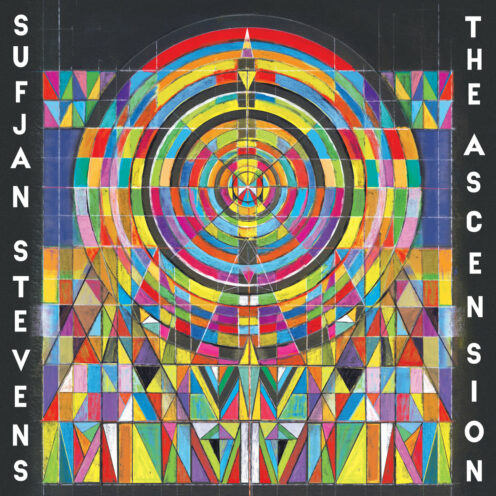
When reviewing a new record from Sufjan Stevens, at this stage in his 20+ year career, the opening paragraph practically writes itself. You can start by recapping his much-publicized, albeit half-serious, ambitions to create an album about each US state; then discuss his (also ambitious) zany pursuits, many of which involve Christmas songs; then shift to his mid-career pivot towards spazzy electronica; and then take us to his critically acclaimed acoustic works over the past five years. Let’s forgo all that (at least any further) and just state the obvious fact that Stevens’s new record, The Ascension, adds to a singular, shape-shifting discography. Which, if you haven’t listened, or listened much, to any of this output, then I suggest you do not start with Stevens’s newest album, which is not necessarily a “for fans only” release but doesn’t consistently capture the magic of earlier records. Instead, let me suggest the first half of Illinois for dazzling orchestral Americana that sounds as unique now as it did 15 years ago; the last two songs from The Age of Adz for glitchier electronica rooted in folk, as if I’m Wide Awake It’s Morning and Digital Ash in a Digital Urn were synthesized into one record; and the middle of Carrie and Lowell for achingly vulnerable, sparsely arranged songs about abandonment, death, love, and forgiveness.
For those familiar with Stevens’s work, the obvious touchstone for The Ascension is The Age of Adz, as Ascension employs some of the sounds—the glitchy electronica, the pervasive drum machines—as well as the synths-over-guitars approach that define Adz. But Ascension is not a second Adz. In many ways, Ascension is a less ambitious record: no song matches the excesses and mad-scientist creativity of “Age of Adz” or the grandeur of mini-album “Impossible Soul,” and though Ascension’s run-time is longer—clocking in at 80 minutes, the good old CD cut-off time—its palette is more constrained, as The Ascension is, through and through, an electronic pop album. That’s not to say this unified style does not totally work; the new approach forces Stevens to mine for different textures, moods, and rhythms to animate and diversify his record, and in doing so Stevens lands on new sounds that prove excellent stylistic fits. “Video Game,” for instance, is his ode to the 1980s, an ebullient dance track that is as oft-kilter as it is immediately infectious, while “Run Away with Me” and “Tell Me You Love Me” are slow-burning, pillow-whisper love songs that skew closer to R&B than any other material from Stevens’s catalogue. Stevens also indulges, to lesser effect, in clubby, EDM-like breakdowns, like on the opener of “Make Me An Offer I Cannot Refuse,” which sounds at one point like it’s shooting out laser beams à la Yeezus’s beautifully hideous opener “On Sight.”
Where the record falters, though, is its lyrical inscrutability. Many of the songs are directed at a vague “you” (or a “love” or a “baby”) who is sometimes an object of affection, sometimes a source of goodness, and sometimes cruel and calculating. This subject may or may not be the same person (or deity)—it’s difficult to keep up, or even to know if it matters to do so. Unlike Carrie & Lowell or Stevens’s geographically rooted records, Ascension is less explicit in its narrative and themes, which, coupled with its steelier instrumentals, makes for a colder and less inviting listen. So once you settle into The Ascension’s aesthetic and reach the album’s middle—like the energy-sapping “Die Happy” or, later, the protracted “Sugar”—it takes a surprising amount of effort to remain focused on the usually compelling Stevens.
These issues contrast starkly with the penultimate track, “The Ascension,” where Stevens ditches the drum kits and retains just a solitary keyboard. The song is defined by its clarity: sonically, Stevens’s feathery voice is given space to shine in the foreground, which, after an hour of largely dense electronics, comes as a welcome relief. Lyrically, too, the song is clear and crushing, as Stevens narrates the erosion of his sense of self-importance and ability to engender change (“I thought I could change the world for best … I thought I was sanctified and blessed”), leaving him only to wonder aloud, “What now?”. Alongside “Video Game,” “The Ascension” is the record’s standout; it is gorgeous, haunting, climactic, and subtle—a reminder of Stevens’s outsized abilities as a singer, producer, and songwriter. But it also, unfortunately, stands in contrast to the record’s other songs, which, while perhaps musically more audacious, cannot ascend to the same impressive heights.
 Video Game
Video Game